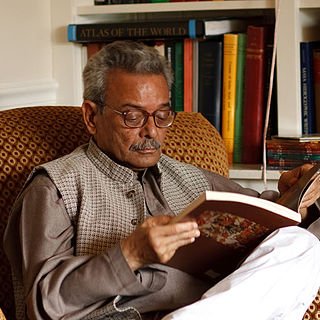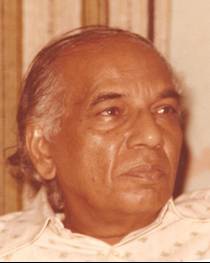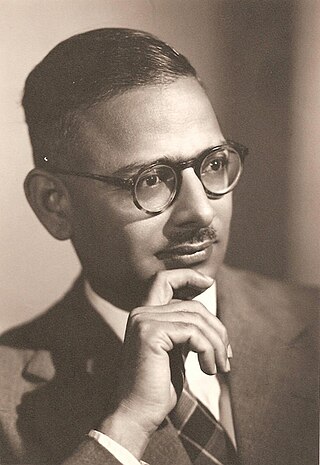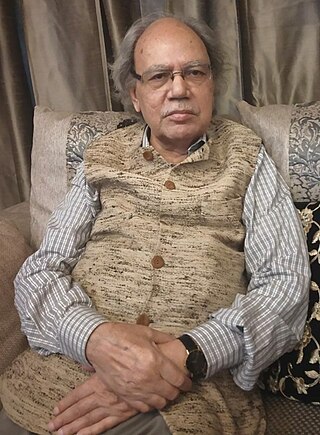Literature of Kashmir has a long history, the oldest texts having been composed in the Sanskrit language. Early names include Patanjali, the author of the Mahābhāṣya commentary on Pāṇini's grammar, suggested by some to have been the same to write the Hindu treatise known as the Yogasutra, and Dridhbala, who revised the Charaka Samhita of Ayurveda.
The surname Al-Zaidi (Az-Zaidi) can denote one or both of the following:

Urdu poetry is a tradition of poetry and has many different forms. Today, it is an important part of the culture of India and Pakistan. According to Naseer Turabi, there are five major poets of Urdu: Mir Taqi Mir, Mirza Ghalib, Mir Anees, Muhammad Iqbal and Josh Malihabadi. The language of Urdu reached its pinnacle under the British Raj, and it received official status. All famous writers of Urdu language including Ghalib and Iqbal were given British scholarships. Following the Partition of India in 1947, it found major poets and scholars were divided along the nationalistic lines. However, Urdu poetry is cherished in both the nations. Both the Muslims and Hindus from across the border continue the tradition.

Urdu literature comprises the literary works, written in the Urdu language. While it tends to be dominated by poetry, especially the verse forms of the ghazal and nazm, it has expanded into other styles of writing, including that of the short story, or afsana. Urdu literature is popular mostly in Pakistan, where Urdu is the national language, and in India, where it is an Eighth Schedule language.

Asrar-ul-Haq, better known as Majaz Lakhnawi, was an Indian Urdu poet. He is known for his romantic and revolutionary poetry. He composed ghazals and nazms in Urdu. He was the maternal uncle of poet and screenplay writer Javed Akhtar and Indian-American psychoanalyst Salman Akhtar.
Ralph Russell SI was a British scholar of Urdu literature and a Communist.

Bashir Badr is an Indian poet. He was teaching Urdu in Aligarh Muslim University. He primarily writes in Urdu language particularly ghazals. He also wrote a couplet titled Dushmani Jam Kar Karo in 1972 during Shimla Agreement that revolves around the partition of India. Most of Badr's unpublished literary work, including an uncertain number of poems was lost during the 1987 Meerut communal riots, and later he moved to Bhopal, Madhya Pradesh.

Shamsur Rahman Faruqi was an Indian Urdu language poet, author, critic, and theorist. He is known for ushering modernism to Urdu literature. He formulated fresh models of literary appreciation that combined Western principles of literary criticism and subsequently applied them to Urdu literature after adapting them to address literary aesthetics native to Arabic, Persian, and Urdu. Some of his notable works included Sher-e-Shor Angez (1996), Ka’i Chand The Sar-e Asman (2006), The Mirror of Beauty (2013), and The Sun that Rose from the Earth (2014). He was also the editor and publisher of the Urdu literary magazine Shabkhoon.

Syed Ali Jawad Zaidi was an Indian Urdu poet, scholar, and author of over 80 books in several languages. He was also an Indian independence activist, lawyer and later, a civil servant, but is best known for his work in Urdu literature.
Akhlaq Mohammad Khan, better known by his takhallusShahryar, was an Indian academic, and a doyen of Urdu poetry in India. As a Hindi film lyricist, he is best known for his lyrics in Gaman (1978) and Umrao Jaan (1981) directed by Muzaffar Ali. He retired as the head of the Urdu Department at the Aligarh Muslim University, and thereafter he remained sought after name in mushairas or poetic gatherings, and also co-edited the literary magazine Sher-o-Hikmat.

Malik Ram Baveja (1906–1993) was a renowned Urdu, Persian and Arabic scholar from India. He received the Sahitya Akademi Award in 1983 for his monumental work Tazkirah-e-Muasireen.
Syed Amin Ashraf was an Indian Urdu Ghazal poet and critic. He earned his PhD in English Literature from Aligarh Muslim University on the topic Major Themes and Imagery in Sarogini Naidu's Poetry, and later served the same department. He produced three poetic collections and a critical compendium of essays in the form of a book. Several academic awards were conferred on his poetic anthologies, and numerous critical articles and books praised his poetic artistry.
Rehana Khatoon is an Indian scholar, teacher of Persian language, former Head of the Department of Persian, University of Delhi and the author of Encyclopaedia of Persian Language and Literature . She was honoured by the Government of India, in 2014, with the Padma Shri, the fourth highest civilian award, for her contributions to the propagation of Persian language and literature. Rehana Khatoon is the first woman alumni of the Aligarh Muslim University to be awarded the Padma Shri.
Nazir Ahmed (1915-2008) was an Indian scholar, writer, and teacher of the Persian language. He was honoured by the Indian Government in 1987 with the Padma Shri. He received this award for his contributions to the propagation of Persian Language and literature.

Sajida Zaidi was an Indian educationist, writer in the Urdu language, and poet. For many years she was a professor and head of the Department of Education at the Aligarh Muslim University (AMU) until her 1966 retirement.
Ze Khe Sheen was an Indian poet and writer who wrote in the Urdu language and was also an activist for women's rights. She published her poetry under the pseudonyms Zay Khay Sheen and Nuzhat, as her conservative Muslim society did not permit women to write poetry or initiate movements upholding the rights of women. She belonged to a rich family of landholders of the Sherwani tribe. Her poems and ghazals in Urdu, which had a "female touch", had romantic appeal for young people.

AMU Literary Festival is an annual literary festival organised by Aligarh Muslim University. University Debating and Literary Club (UDLC) formerly University Literary Club of the university organises the festival. Some of the previous invitees include news anchor and author Rajdeep Sardesai, poet Keki N. Daruwalla, politician Mani Shankar Aiyar and independent journalist Rana Ayyub.

Shamim Hanafi was an Indian Urdu critic, dramatist and a proponent of modernist movement in Urdu literature. His books on modernism include The Philosophical Foundation of Modernism and New Poetic Tradition. He was associated with the Jamia Millia Islamia to the extent of becoming a professor emeritus.
Asloob Ahmad Ansari was an Indian writer, critic, former professor of English department of Aligarh Muslim University and editor of Naqd-o-Nazar, Urdu magazine. He wrote in English and Urdu throughout his literary career. His work revolves around study of English and Urdu and research on Muhammad Iqbal, Ghalib and Sir Syed Ahmad Khan. He also wrote about William Blake and William Shakespeare.
Abul Kalam Qasmi was an Indian scholar, literary critic, and a poet of the Urdu language who served as the dean of the Faculty of Arts at the Aligarh Muslim University. He was the editor of Tehzeeb-ul-Akhlaq and authored books such as The Criticism of Poetry. He translated E. M. Forster's Aspects of the Novel into Urdu as Novel ka Fun. He was conferred with the Sahitya Akademi Award in 2009, and the Ghalib Award in 2013.










